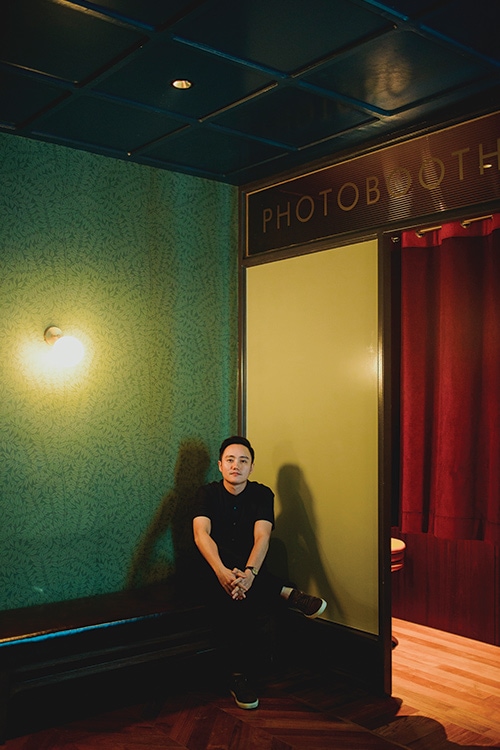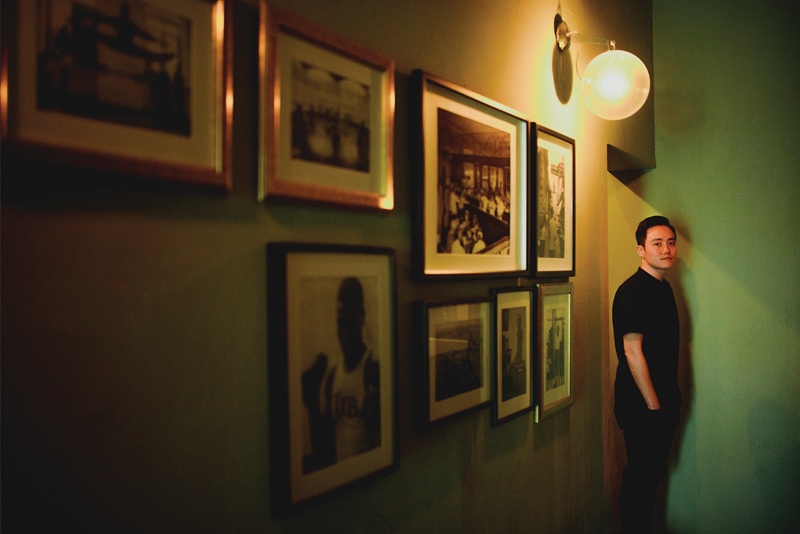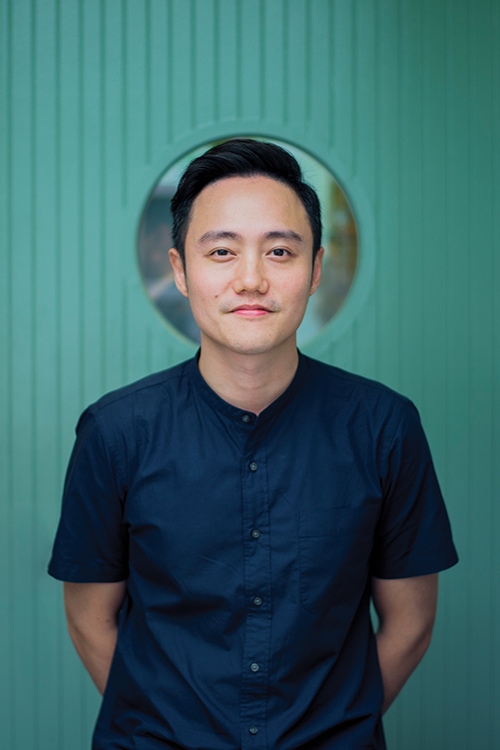Boo Junfeng Is Learning to Have More Empathy
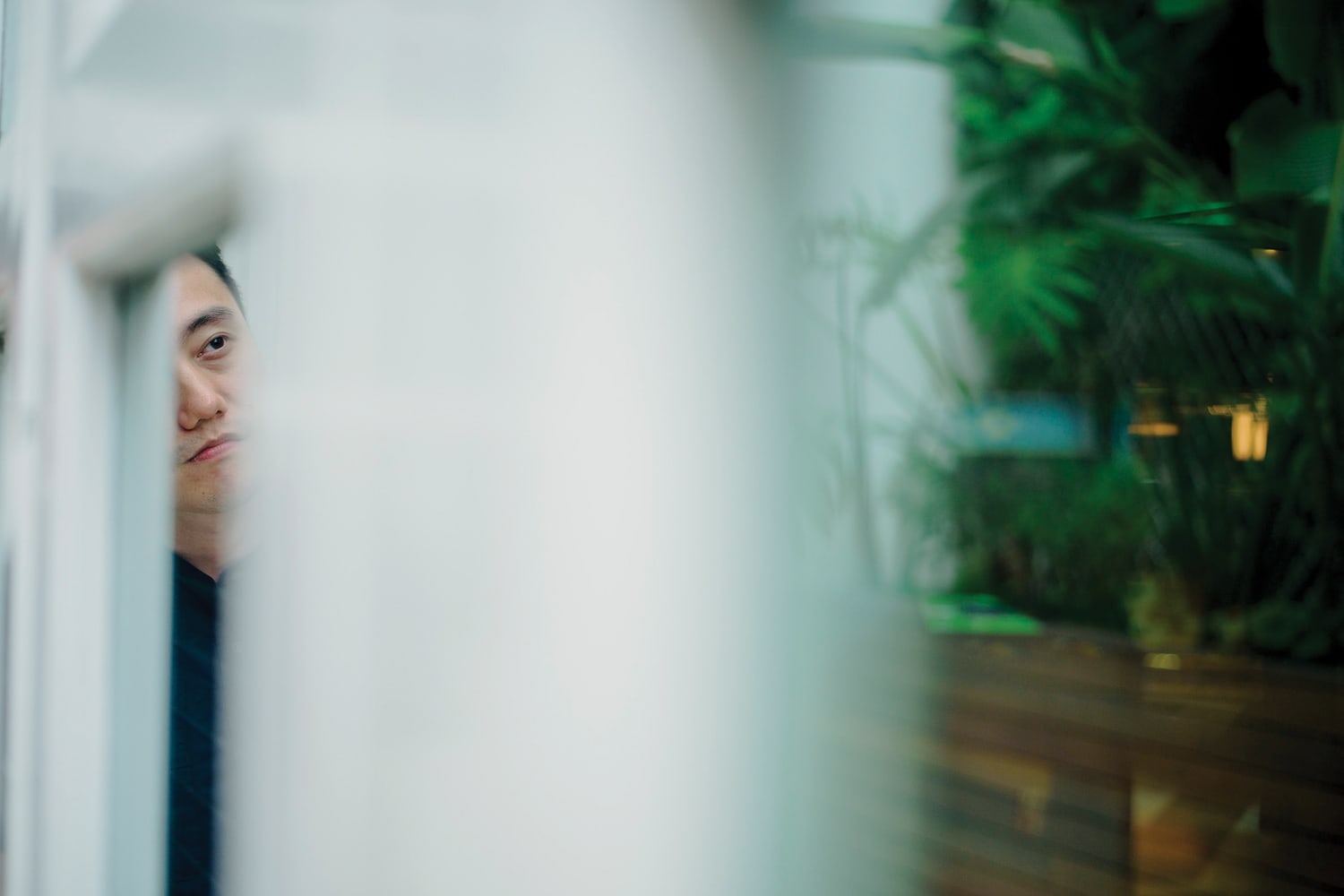
I’m a Samsui woman. Not a writer or even a girl living in the 21st century, but a penniless, bone-weary Samsui woman, toiling hard under the sun. I’ve just spent a whole day as a background extra on the set of a short film for the 2018 National Day Parade. Just as I’m about to head home, the casting lady walks up to me and says, “Congratulations, you’ve been chosen to act in an additional scene. You’ll have to stay another two to three hours.” Sitting beside me, a fellow extra offers a look of sympathy—and for a moment, I wish I could be taking a cold shower instead of putting on a stifling red headdress. I look around and it’s just going to be me and four others. Thoughts run through my mind on how I can impress the director. 8 months later, I’ve been told I’ll be interviewing Boo Junfeng. I type his name in Google, and a headline catches my eye: “NDP 2018 Creative Director Boo Junfeng. . .” The more I think about it, the more I recall how I’d struggled to recognise who the director was on set. Everyone says Junfeng is a private, introverted person who fully embraces being a behind-the-scenes type of director. He keeps a quiet watch over the set—so quiet, you’ll wonder if he’s there at all. Unlike most filmmakers, he rarely yells “cut” or “action”, choosing instead to sit back and observe. Even when he is not directing, he’s just as soft-spoken. It’s 3:30pm, and I’m right on time. The bar at Straits Clan is empty save for a meditative presence at the far end of the room. As I cautiously approach the low-profile filmmaker and founding member of Pink Dot, I catch a momentary, almost cinematic glimpse of him looking out towards the glass windows—his eyes distant and contemplative, before turning abruptly towards me. He clearly doesn’t recognise me. Perhaps this is my second chance to make a good first impression. Much of our time together is spent in silence as Junfeng thinks through each word before voicing them, echoing a director’s careful treatment of each detail in a scene, exercising utmost deliberation into what he omits. Despite spending more than an hour with the 35-year-old, I still find it difficult to suss him out. What’s certain is that beneath his unassuming appearance is a nonconformist soul that champions the minority. “I care a lot about making films the way I think they should be,” he says. “They may not be the most crowd-pleasing, but I’m not trying to reach the lowest common denominator by making films that people want to see.” While Junfeng admits to being a dictator on set in the past, he has learnt to loosen his grip and savour the process of collaboration, especially after last year’s National Day Parade. This change is also reflected in his personal life and he is a proud parent of a Shiba Inu—a role he did not expect to take on. “Ever since I got a dog, I realised I can actually take care of things. Before that, I thought I wasn’t destined to be a parent of any sort.” The comely auteur is currently working on his next film and although it is still in its infancy, I’m filled with anticipation simply by how much his work is infused with such raw pathos.
ANGELA LOW: What was the first film you saw that made an impact on you?
BOO JUNFENG: Honestly, I can’t really… [long pause] I know for some filmmakers, they have the film. I don’t really have one. In fact, when I first started out, I was more interested in the behind-the-scenes featurettes, rather than the films themselves.
ANGELA: Have you always known you wanted to make films?
JUNFENG: Ever since I was 15, I wanted to be a filmmaker. I was very fascinated by filmmaking, the details, everything that’s within a frame, and the ability to take people to a different place, whether it’s through costumes, set pieces or stories. I wanted to know how things were done and how I could be a part of this world. It wasn’t just about directing.
ANGELA: What did you grow up watching?
JUNFENG: I watched a lot of Oscar movies, especially the ones with period set pieces. Maybe it’s part of this romantic fascination about the past that I’ve always had. I was so inspired by the idea of being able to take people to a different place, a different human experience, or a different era through storytelling.
ANGELA: Were you a big reader back then?
JUNFENG: Unfortunately, no. I didn’t do very well in school until my parents told me I could go to film school. Suddenly, I felt like I had a purpose in life. Ironically, when I was in film school, I was very into historical and period films. Yet, when I was in secondary school, history was one of my worst subjects. With these historical movies, the emphasis wasn’t about the dates, but the human experiences and emotions. I was drawn to larger-than-life experiences, like the war or what the historical figures had to go through in the past. It gave me an insight into the human experiences that I didn’t get from textbooks. In retrospect, I should have done better in history, literature or the humanities in general, but I didn’t feel motivated at all when I was younger.
When I went to film school, I went from being the third lowest in class—I used to get a yellow slip and was at risk of having to retake modules—to suddenly topping the class. I think it had little to do with talent, and everything to do with motivation. All of a sudden, I loved what I was doing. I loved going to school to learn and understand the world through films. I came alive because of that. [laughs] I was hungry in a way that I had never been before.
ANGELA: You come across as such a well-spoken person. It’s surprising to learn that you weren’t a good student in the past. What’s more surprising is the fact that your first short film, A Family Portrait, actually won awards—one of them being the Best Short Film at the 18th Singapore International Film Festival. I just assumed that you had a natural aptitude for filmmaking. Do you consider yourself a good storyteller?
JUNFENG: [long pause] I don’t know. After I made A Family Portrait, I came back from Spain and I was conscripted immediately. I didn’t really know what to do with the film. I had it in the can and was editing it at home. When it was done, I showed it to a few friends and they liked it. Then, someone told me the Singapore International Film Festival was coming up and I should submit my film. So I thought: okay lah, try lah. For me, it was about having the opportunity to put my sensibilities out there visually and sonically, and to put together a coherent piece of work that made sense in my mind and in my heart. It was a representation of how I saw the human condition or the world. And having people resonate with that made me realise that maybe I could be a director [laughs].
I knew I enjoyed making films but I wasn’t very careerist about it. I wasn’t calculating, okay, my first film needs to be at this festival, my next film needs to win that award. I was just feeling my way around in the dark. I was very lucky that things aligned and some important people in the industry noticed my work and gave me further opportunities.
ANGELA: How much of the creative process, whether it’s writing the film or being on set, is based on emotion?
JUNFENG: For me, the inspiration often comes from an emotional place because I care a lot about how, for example, our society looks at or are ignorant to certain things. Therefore, I am affected emotionally when things happen or don’t happen, whether it’s pertaining to human rights or the law. I feel compelled to address it. In the process of making a film, it tends to be challenging because it’s a balance between feelings and logic. There are also a lot of things that need to make sense, at least for the kinds of stories I want to tell. Usually, when I am directing actors, I am the judge of how they perform and sometimes the coach who guides them on how to deliver what the script or the moment requires. So yes, I have to invest emotions in them. But ultimately, as a director, you also need to distance yourself and to know what you can use during the editing process. For example, if this moment makes sense in the overall scheme of things.
The writing process tends to be quite lonely because even though I work closely with my producers to develop a story, when you’re writing dialogue or specific moments, especially emotionally charged ones, you’re investing a lot of your feelings into the characters to bring them alive on the page. The writing process is more emotional than the directing process because the directing process is where you’re offloading it to the actors. When I had to write and research, sometimes I meet people with very heart-breaking stories. I absorb a lot of it and try to put it onto the page, so that the actors and crew have something to work on later.
ANGELA: When you’re writing, are you focused more on trying to convey a message, or evoking an emotional response from the audience?
JUNFENG: It’s not about the message for sure, unless you’re doing a three-minute short with a very specific purpose. If it’s part of a campaign like what I do for Pink Dot and NDP, you make a clip to register a point. When it’s a feature film, it’s about the themes you care about and how you breathe life into these characters. What is it about the human condition that you want to show? That’s what a filmmaker needs to do.
ANGELA: What do you hope your viewers will take away from your films?
JUNFENG: [long pause] My films and a lot of other things that I do are about inspiring a greater sense of empathy in society, and wanting people to consider the minority a bit more. I feel like society and the world can use a lot more of that.
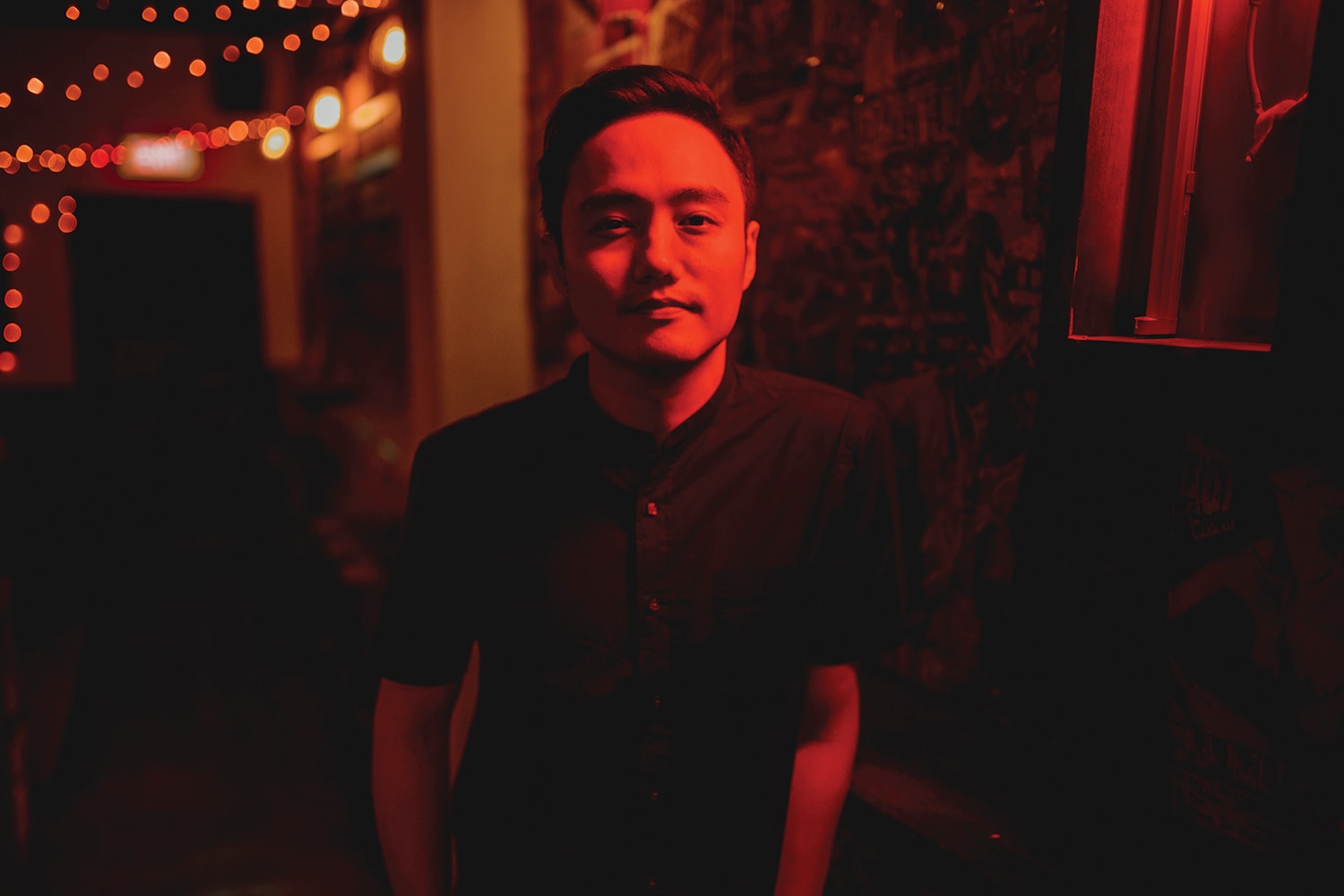
ANGELA: You once said in an interview that you felt inadequate when making your first film, so you took your time with the second one. Now that you’ve passed that stage, do you still struggle with inadequacy?
JUNFENG: I guess I can’t claim to be young anymore. I was already in my 30s when I made Apprentice [laughs]. Yeah, in recent years, I feel like I have a better grasp of the human condition. When I look back at some of the work I did in my 20s, I see that a lot of the themes were framed as questions. In A Family Portrait—I did that when I was 19—it was, what is sex? In Sandcastle, my first feature film, they were framed as questions of a young man who was trying to find himself amongst these different competing and contradictory narratives. Now I feel like I’m in a more comfortable place to say things. Also, when I’m working with actors, I’m a lot more comfortable with telling them what they should be feeling.
ANGELA: Was that a difficulty in the past?
JUNFENG: I remember when I was first working with actors, sometimes I felt intimidated. How was I going to tell a 70-year-old man about life? I didn’t feel like I was qualified. At most, I could tell them to look here, look there, say this, and keep it more open. Now I can go further into discussions about the character, and look a lot deeper.
ANGELA: What is one personal life experience you’ve had recently that changed the way you look at humanity?
JUN FENG: I can’t think of one at the moment. A lot of these things are not big life events. They’re just incremental things you learn about life.
ANGELA: What about the lessons you’ve learnt over the years, making these films?
JUNFENG: [long pause] For me, I’m constantly exploring I suppose. When you go into researching about the death penalty, meeting religious counsellors, former executioners and people whose family members have been executed, these are people whose life experiences are so much bigger than my own. I go in trying to empathise with what they went through in a very non-judgmental way. With Apprentice, I learnt that it’s possible for a person, someone who seems like an ordinary uncle at the coffee shop, to have killed hundreds of people in his lifetime. He either saw it as his job or took pride in it. I learnt that there are people who see and do things differently, and therefore, my understanding of humanity is different from theirs. I’m constantly learning to have that level of empathy.
ANGELA: How do you form characters?
JUNFENG: There are characters that I feel for. If I look deep enough at who they are, what motivates them, and what changes them, there is something that says a lot about humanity. These are the things I consider when I think about the characters that I want to spend years of my life trying to get into the shoes of. Of course, I need to find points of entry in my own understanding of life to fully appreciate and flesh out who they are. Often, it requires research, and sometimes emotional research. You’re not just asking questions about what happened or how it happened, but also how they felt when it happened.
ANGELA: What is one emotion you are fascinated by?
JUNFENG: Maybe anger. Anger makes people irrational and unpredictable. What triggers it or what is a consequence of it, is very interesting.
ANGELA: Have you tried to explore that in your films?
JUNFENG: I wouldn’t say I have. Maybe in the next one!
ANGELA: Are you always searching for the next story, the next idea?
JUNFENG: Searching? No. Because there are so many ideas on the back burner. It’s whether I have the opportunity to sit down and work on them.
ANGELA: When you find an idea that you’re hooked on, do you think about it 24/7?
JUNFENG: No, because they tend to be very heavy. I would have major depression. Maybe that’s partly why it takes a while to make a film (Apprentice took five years; Sandcastle took three years). My calendar is also populated by several other things, but doing a feature film requires the most discipline. I have producers who chase me, but at the end of the day, it’s up to me and how much I want to make it happen. I try and prioritise it, but along the way, I’m often distracted by two main things. Things I care a lot about like the Pink Dot campaign, and things I need to do to pay the bills such as commercials. As a result, the timeline for making my films can be stretched out a lot longer than they should be.
"Some of the most life-changing experiences and biggest life lessons I’ve had are through the films of Lee Chang-dong, Hirokazu Kore-eda or the Dardenne brothers, and I want to share those experiences with as many people as possible."
ANGELA: Your films like Sandcastle and Apprentice are obviously very successful (the former was the first local film to be screened at Cannes Film Festival’s International Critics’ Week, while the latter was Singapore’s official entry for the Oscars’ Best Foreign Language Film in 2017), but how much money can one make from such films? Is it enough to make a decent living?
JUNFENG: I care a lot about making films the way I think they should be. They may not be the most crowd-pleasing, but I’m not trying to reach the lowest common denominator by making films that people want to see. I’m more interested in making films that I think people should see and with that comes the question of how marketable they can be. Over the years, I’ve learnt how to pitch them, how to find the right partners and investors to come on-board, and how to have sustainable projects in the way I want to make them. At the same time, when the films are made, I try and push them as widely as possible.
To me, it’s very important to educate the public and to raise film literacy. Cinema isn’t just about superhero films, but increasingly, that’s all we see these days. That’s why I care a lot. I’m on the board of the Singapore International Film Festival now because I really believe in their vision of trying to expand that space for non-commercial films. Films aren’t just products you watch with popcorn for two hours of entertainment. Some of the most life-changing experiences and biggest life lessons I’ve had are through the films of Lee Chang-dong, Hirokazu Kore-eda or the Dardenne brothers, and I want to share those experiences with as many people as possible.
ANGELA: What’s the last film that made you cry?
JUNFENG: I actually don’t cry much in films. I know there was one, but I can’t remember. I marvel a lot, like, wah, this filmmaker is able to do this. I’m not necessarily looking at things technically. I’m just amazed when I see a master filmmaker execute something. It might’ve been a very unexpected film that I cried in, not a Lee Chang-dong or anything like that. I’m watching Roma tomorrow, so maybe it’ll be Roma. Oh, I remember one film that I cried in. It’s totally not arthouse at all. It’s a dog movie, one of those films where any dog owner who watches it will completely break down. It’s totally manipulative.
About good films I’ve seen lately... I saw Leave No Trace on the plane, a film about a father and daughter who live in the forest, and they get separated because of social services. It was a very well-told story. Burning by Lee Chang-dong is another one. You don’t know why it draws you in, but it does, and it’s very haunting. The images stay in your head for weeks. A very arresting film I’ve seen about 10 years ago is 4 Months, 3 Weeks, 2 Days, a Romanian film by Cristian Mungiu about two young women in the 80s in Romania. One of them is pregnant and the other is trying to help her get an abortion. This was when abortion was illegal in Romania. That one was really gripping. I highly recommend that.
[One day later, in a text message]
JUN FENG: I cried watching Roma. It’s quite a magnificent film.
ANGELA: What is one thing that most people don’t know about you?
JUN FENG: I don’t know what people don’t know about me. I know what I didn’t know about myself. Ever since I got a dog, I realised I can actually take care of things. [laughs] She’s now three years old. Before that, I thought I wasn’t destined to be a parent of any sort.
ANGELA: What’s her name?
JUNFENG: Peanut. My partner actually got her from Japan. It’s a part of adulting I suppose, to learn about these things.
ANGELA: Do you find that being an introvert is an advantage or a double-edged sword when it comes to directing?
JUNFENG: A lot of good filmmakers I know are introverts. I surround myself with people who can help me: assistant directors who are able to run the set and producers who are able to help me network and reach out to people for funds, while I do what I do.
ANGELA: Anthony Chen once told us all directors are control freaks. Is that true for you?
JUNFENG: Yeah, we’re all control freaks. Otherwise, you can’t do what you do. But part of the process, for me at least, is in learning to let go when I have to and trust my collaborators to be the professionals and artists that they are–allowing them to bring something else to the table that I wouldn’t have been able to. While they carry out the vision I’ve set, I’ll allow them to take it to different places. Increasingly, I’m finding that enjoyable, but that hasn’t always been the case.
ANGELA: Why’s that?
JUNFENG: In the past, I felt like I could do everything. It was a lot more instructional. Now I find the collaborative process enjoyable. For example, taking on something like the National Day Parade, I was in several ways, technically at least, out of my depth. I’ve never done a show or dealt with so many choreographers before. With a film, it’s a lot easier to dictate. If you’re the writer, you’re writing it, and when you’re directing it, even if things don’t go entirely your way on set, you can always edit it afterwards. With a live show, as you’re executing it, it takes a shape of its own, and luckily that shape wasn’t so far off from the original vision. Most of the show participants are not professionals either. I had to learn how to work with their strengths and energy. That whole year taught me about the spirit of collaboration.
ANGELA: What about your films? Do you allow it space to shape into something slightly different, or do you stick to a singular vision?
JUNFENG: With a film, it’s harder. The director is the one constant throughout. You’re entirely responsible for what the film becomes. In the past, I would really dictate that all the way. Now, I’m learning to listen, and say, okay, that makes sense, why don’t we try that? It also helps that with a bit more experience, you know how to deal with other people’s inputs without feeling as though it’s taking away from what you had envisioned. It takes experience and confidence.
ANGELA: How would you define your filmmaking style?
JUNFENG: I honestly don’t know what my style is. [laughs] I’ve only made two feature films, and I’d like to think they’re different, though some people tell me they’re similar. Maybe a decade or two later, I can tell better. Even with my peers, most of them have only done one film. It’s hard to define that, and I think it’s a bit unfair to define filmmakers after their first film. There’s so much more they can and should do.
ANGELA: So what are you currently working on?
JUNFENG: I’m working on my next film. I’ve been writing it for the past few months. It’s going to take a few more years.
ANGELA: Anything you’re able to share with me right now?
JUNFENG: Not yet. It’s still too early. I don’t even have a script yet [laughs].
***
Edited by Wy-Lene Yap
